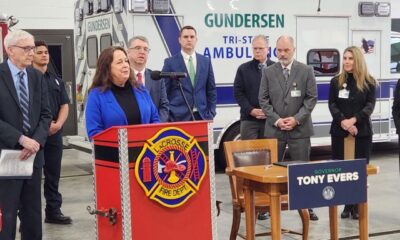Coronavirus
Vaccine dry ice demands could impact Wisconsin’s signature cheese industry

Among the latest supply chain concerns in the COVID-19 pandemic is the need for dry ice to help distribute vaccines.
Used commonly in food production and packaging, dry ice is closely connected to key agriculture industries for Wisconsin such as ethanol and cheese.
Carbon dioxide, a key ingredient for dry ice production, is a co-product of ethanol production. That industry felt the negative effects of COVID-19 as fewer people were traveling, and some plants even closed production, according to Randy Romanski, secretary-designee for the Wisconsin Department of Agriculture, Trade and Consumer Protection.
On Wednesday, Gov. Tony Evers gave $3.25 million to the ethanol industry through CARES Act Funding to help recover some of those losses and continue production.
For cheesemakers, dry ice is a critical component used to maintain appropriate temperatures for cultures. Romanski said his office has been working closely with industry partners, such as the Wisconsin Cheesemakers Association, as well as U.S. Sen. Tammy Baldwin, to avoid dry ice supply issues.
“Pfizer has said that they are going to require an additional two tons of dry ice daily,” Romanski said. “Right now, it is our understanding that they have plans to produce and distribute dry ice from one of their existing facilities.”
He added dry ice manufacturers have plans to help prioritize essential customer needs in addition to making sure dry ice is available for vaccine distribution.
“It’s our understanding of the dairy industry is considered one of those essential customers,” Romanski said.
Dry ice manufacturers also expressed the ability to ramp up production if necessary.







